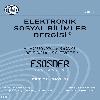Fundamentals of islamic wconomy and finance: Theory and practice
Bu makale, İslam ekonomisi ve finansının temel ilkelerini incelemektedir. Karma mülkiyet, belli bir sınır içinde ekonomik özgürlük ve sosyal adalet, İslam ekonomisinin temelleridir. Bu ilkeler ancak zekat ve faizin yasaklanması gibi kurumsal reformlar yoluyla yürürlüğe konulabilirler. Katılımcı finansmanın kâr ve zararın paylaşımı prensibine dayalı faizsiz bankacılık sistemi, İslami finansın merkezinde yer almaktadır. İslami bankacılık, geleneksel bankacılık sistemine üstün bir alternatif olarak önerilmesine rağmen, uygulamada beklentileri karşılayamamıştır. Bunun nedeni, İslam ekonomisi ve finansı lehindeki tartışmanın esas itibariyle iktisadi olmaktan çok dünyanın çeşitli bölgelerindeki Müslüman kimliğini korumaya yönelik olmasıdır. Türkiye‟nin İslami finans deneyimi, 1980'lerin ortasında finansal liberalleşme politikasının bir parçası olarak başlamıştır. Ne var ki, İslami finans ve bankacılık bugüne kadar istenen gelişme düzeyine ulaşamamıştır.
İslam ekonomisi ve finansının temelleri: Teori ve uygulama
This paper examines the basic principles of Islamic economy and finance. Multi-faceted ownership, economic freedom within a certain limit, and social justice are fundamentals of Islamic economics. These principles can only be implemented through the institutional reforms such as zakat and prohibition of interest. Interest-free banking based on the principle of profit and loss sharing of participatory financing is at the center of Islamic finance. Although it is proposed as a superior alternative to conventional banking system, Islamic banking could not live up to expectations in practice. It is because rather than being essentially an economic one, the argument in favor of Islamic economy and finance was to protect Muslim identity in various parts of the world. Turkey's experience with Islamic finance began in the mid 1980s as a part of financial liberalization policy. Yet the Islamic banking and finance could not achieve the desired level of development till now.
___
- ABDUL GAFOOR, A. L. M. (1995), Interest-free Commercial Banking, Groningen: Apptec Publications.
- ABDUL GAFOOR, A. L. M. (2001), “Mudaraba-based Investment and Finance”, _____http://users.bart.nl/~abdul/>, (6 February 2001).
- ES-SADR, Muhammed. B. (1980), İslam Ekonomi Doktrini, (Çev. M. Keskin ve S. Ergün) Üçüncü Baskı, Şelale Yayınevi, İstanbul.
- GAZZALI, I. M. (1971), Ihya Ulum-id-din, English Translation by Al-Haj maulaana Fazlur Karim, Lahore, Pakistan: Sind Sagar Academy.
- GÜNAL, Mehmet. (2007), Para Banka ve Finansal Sistem, 2. Baskı, Ankara: Yeni Dönem Yayınları.
- IBRAHIM, Rakiya. (2000), “Islamic Banking and Conventional Banking: A Comparative Analysis”, _____http://www.gamji.com/NEWS358.htm>, (6 February 2001).
- JANG, Ji-Hyang. (2003), “The Politics of Islamic Banks in Turkey: Taming Political Islamists by Islamic Capital”, Conference Paper, Annual Meeting of the Midwest Political Science Association, Chicago, IL.
- KURAN, Timur. (1995), “Islamic Economics and the Islamic Subeconomy”, Journal of Economic Perspectives, Vol.9, No.4, pp.155-173.
- KURAN, Timur. (1997), “Islamic Economics and the „Clash of Civilizations‟ ”, Middle Eastern Lectures, Number Two, The Moshe Dayan Center for Middle Eastern and African Studies, Tel Aviv University, pp.25-38.
- KURAN, Timur. (2002), “Islamic redistribution through zakat: historical record and modern realities”, In Poverty and Charity in Middle Eastern Contexts, (ed. Michael Bonner, Mine Ener, and Amy Singer), Albany: State University of New York Press, (forthcoming).
- NIDA'UL ISLAM. (1995), “Principles of Islamic Banking”, _____http://www.islam.org.au/articles/older/Banking.HTM>, (6 February 2001).
- NOMANI, Farhad. (2003), “The problem of interest and Islamic banking in a comparative perspective: the case of Egypt, Iran and Pakistan”, Review of Middle East Economics and Finance, Vol.1, No.1, pp. 37-70.
- SADR, Muhammad. B. (1994), Iqtisaduna (our economic), Second Edition, Tehran, Iran.
- TAHERI, Muhammad. R. (2000), “The Basic Principles of Islamic Economy and Their Effects on Accounting Standards-Setting”, _____http://islamic-finance.net/>, (6 February 2001).
- THE HOLY QUR'AN. (1983), Text, Translation and Commentary by A. Yusuf Ali, Amana Corp.
- ZAHER, Tarek S. and M. Kabir HASSAN. (2001), “A Comparative Literature Survey of Islamic Finance and Banking”, Financial Markets, Institutions & Instruments, Vol.10, No.4, pp. 155-99.
- Yayın Aralığı: Yılda 4 Sayı
- Yayıncı: Cahit AYDEMİR
Sayıdaki Diğer Makaleler
Fundamentals of islamic wconomy and finance: Theory and practice
AY. m 36 bağlamında şikayet hakkı ile ilgili bir vakıa incelemesi-yargıtay içtihat eleştirisi
Piyano sınavı değerlendirme puanlayıcılara yönelik geçerlik ve güvenirliği
Teachers' opinions on computer-assisted chemistry teaching
Sanat eserlerinde korku imajı ve korku duygusu yenebilmede sanatın rolünün irdelenmesi
Kavram çarkı diyagramının öğrenme başarısına etkisi
Mustafa YEŞİLYURT, Ömer Faruk KESER, Salim ORAK, Ferhat ERMİŞ
Üniversite öğrencilerinin harcamalarının kent ekonomisine katkısı (Uşak Üniversitesi örneği)
Tanzimat dönemi eğitim politikalarında Osmancılık düşüncesinin etkisi
